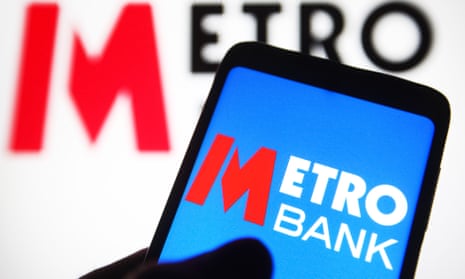Metro Bank shares have slumped after the US private equity firm Carlyle Group said it had ended its interest in buying the UK challenger bank.
Carlyle said it had agreed with the bank “to terminate discussions regarding a possible offer”.
The report of a possible takeover had offered Metro Bank shareholders some hope after a torrid three-and-a-half years in which its market value plummeted from more than £3.6bn in March 2018 to less than £200m on Thursday.
Metro Bank shares had risen from 103p before the talks were revealed earlier this month to 133p, their highest since February. However, they fell by 18% on Thursday to 109p in mid-morning trading.
The bank had burst on to the British high street in 2010 after the financial crisis, claiming to be the UK’s first new bank in more than 150 years. It soared in value as it grew rapidly, with a focus on customer services while also using bank branches in prominent locations even as rivals cut back. Yet in 2019 it was hit by an accounting scandal that involved misreported loans, and shares plunged as its founder, Vernon Hill, and its then chief executive were forced out within two months of each other.
Challenger banks – both those with bank branches and those that rely on digital apps – have struggled to dent the dominance of bigger lenders such as Lloyds and NatWest.
The bank is forecast to make losses before interest and tax of more than £300m in the next two years, according to estimates compiled by the data company Sentieo. However, some observers suggested Carlyle may have been considering an offer because of the prospect of rising interest rates in the UK. Banks can benefit from higher interest rates because they raise the lending costs for borrowers while paying out similar amounts to savers.
However, Carlyle’s interest in Metro Bank was thought to be only in its early stages before it was leaked to the media.
In a response to Carlyle’s statement, the bank said: “The board continues to strongly believe in the standalone strategy and future prospects of Metro Bank.”
